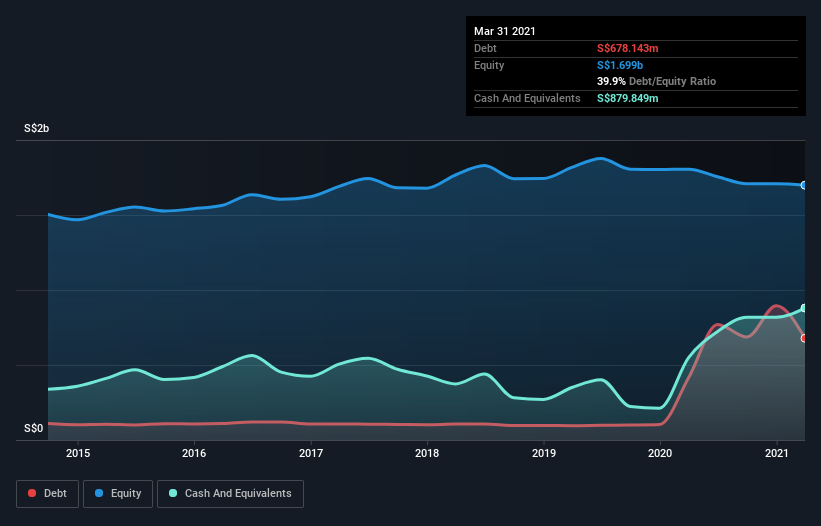
Howard Marks put it nicely when he said that, rather than worrying about share price volatility, 'The possibility of permanent loss is the risk I worry about... and every practical investor I know worries about.' When we think about how risky a company is, we always like to look at its use of debt, since debt overload can lead to ruin. We note that SATS Ltd. (SGX:S58) does have debt on its balance sheet. But the more important question is: how much risk is that debt creating?
Why Does Debt Bring Risk?
Debt is a tool to help businesses grow, but if a business is incapable of paying off its lenders, then it exists at their mercy. If things get really bad, the lenders can take control of the business. However, a more frequent (but still costly) occurrence is where a company must issue shares at bargain-basement prices, permanently diluting shareholders, just to shore up its balance sheet. Of course, debt can be an important tool in businesses, particularly capital heavy businesses. When we examine debt levels, we first consider both cash and debt levels, together.
Check out our latest analysis for SATS
What Is SATS's Debt?
As you can see below, at the end of March 2021, SATS had S$678.1m of debt, up from S$414.8m a year ago. Click the image for more detail. However, it does have S$879.8m in cash offsetting this, leading to net cash of S$201.7m.

A Look At SATS' Liabilities
We can see from the most recent balance sheet that SATS had liabilities of S$565.3m falling due within a year, and liabilities of S$827.7m due beyond that. On the other hand, it had cash of S$879.8m and S$292.7m worth of receivables due within a year. So its liabilities outweigh the sum of its cash and (near-term) receivables by S$220.5m.
Given SATS has a market capitalization of S$4.30b, it's hard to believe these liabilities pose much threat. However, we do think it is worth keeping an eye on its balance sheet strength, as it may change over time. While it does have liabilities worth noting, SATS also has more cash than debt, so we're pretty confident it can manage its debt safely. When analysing debt levels, the balance sheet is the obvious place to start. But it is future earnings, more than anything, that will determine SATS's ability to maintain a healthy balance sheet going forward. So if you want to see what the professionals think, you might find this free report on analyst profit forecasts to be interesting.
Over 12 months, SATS made a loss at the EBIT level, and saw its revenue drop to S$970m, which is a fall of 50%. To be frank that doesn't bode well.
So How Risky Is SATS?
Although SATS had an earnings before interest and tax (EBIT) loss over the last twelve months, it generated positive free cash flow of S$56m. So taking that on face value, and considering the net cash situation, we don't think that the stock is too risky in the near term. With revenue growth uninspiring, we'd really need to see some positive EBIT before mustering much enthusiasm for this business. For riskier companies like SATS I always like to keep an eye on whether insiders are buying or selling. So click here if you want to find out for yourself.
If you're interested in investing in businesses that can grow profits without the burden of debt, then check out this free list of growing businesses that have net cash on the balance sheet.
When trading SATS or any other investment, use the platform considered by many to be the Professional's Gateway to the Worlds Market, Interactive Brokers. You get the lowest-cost* trading on stocks, options, futures, forex, bonds and funds worldwide from a single integrated account. Promoted
New: Manage All Your Stock Portfolios in One Place
We've created the ultimate portfolio companion for stock investors, and it's free.
• Connect an unlimited number of Portfolios and see your total in one currency
• Be alerted to new Warning Signs or Risks via email or mobile
• Track the Fair Value of your stocks
This article by Simply Wall St is general in nature. It does not constitute a recommendation to buy or sell any stock, and does not take account of your objectives, or your financial situation. We aim to bring you long-term focused analysis driven by fundamental data. Note that our analysis may not factor in the latest price-sensitive company announcements or qualitative material. Simply Wall St has no position in any stocks mentioned.
*Interactive Brokers Rated Lowest Cost Broker by StockBrokers.com Annual Online Review 2020
Have feedback on this article? Concerned about the content? Get in touch with us directly. Alternatively, email editorial-team (at) simplywallst.com.
About SGX:S58
SATS
An investment holding company, provides gateway services and food solutions in Singapore, Asia Pacific, the Americas, Europe, the Middle East, Africa, and internationally.
Solid track record with limited growth.
Market Insights
Community Narratives


